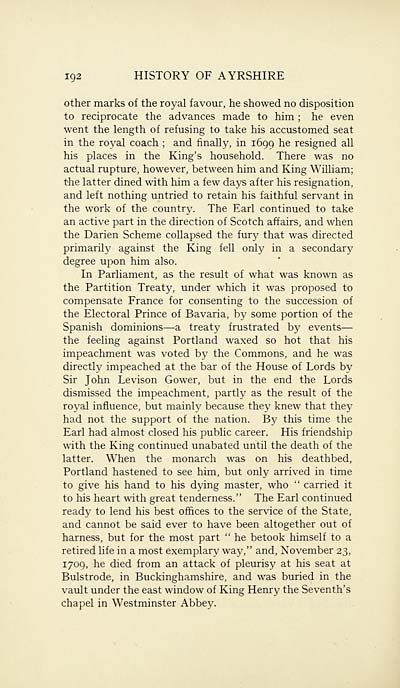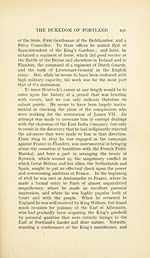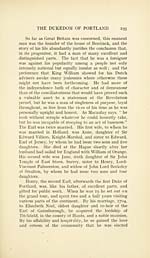Download files
Complete book:
Individual page:
Thumbnail gallery: Grid view | List view

192 HISTORY OF AYRSHIRE
other marks of the royal favour, he showed no disposition
to reciprocate the advances made to him ; he even
went the length of refusing to take his accustomed seat
in the royal coach ; and finally, in 1699 he resigned all
his places in the King's household. There was no
actual rupture, however, between him and King William;
the latter dined with him a few days after his resignation,
and left nothing untried to retain his faithful servant in
the work of the country. The Earl continued to take
an active part in the direction of Scotch affairs, and when
the Darien Scheme collapsed the fury that was directed
primarily against the King fell only in a secondary
degree upon him also.
In Parliament, as the result of what was known as
the Partition Treaty, under which it was proposed to
compensate France for consenting to the succession of
the Electoral Prince of Bavaria, by some portion of the
Spanish dominions — a treaty frustrated by events —
the feeling against Portland waxed so hot that his
impeachment was voted by the Commons, and he was
directly impeached at the bar of the House of Lords by
Sir John Levison Gower, but in the end the Lords
dismissed the impeachment, partly as the result of the
royal influence, but mainly because they knew that they
had not the support of the nation. By this time the
Earl had almost closed his public career. His friendship
with the King continued unabated until the death of the
latter. When the monarch was on his deathbed,
Portland hastened to see him, but only arrived in time
to give his hand to his dying master, who " carried it
to his heart with great tenderness." The Earl continued
ready to lend his best offices to the service of the State,
and cannot be said ever to have been altogether out of
harness, but for the most part " he betook himself to a
retired life in a most exemplary way," and, November 23,
1709, he died from an attack of pleurisy at his seat at
Bulstrode, in Buckinghamshire, and was buried in the
vault under the east window of King Henry the Seventh's
chapel in Westminster Abbey.
other marks of the royal favour, he showed no disposition
to reciprocate the advances made to him ; he even
went the length of refusing to take his accustomed seat
in the royal coach ; and finally, in 1699 he resigned all
his places in the King's household. There was no
actual rupture, however, between him and King William;
the latter dined with him a few days after his resignation,
and left nothing untried to retain his faithful servant in
the work of the country. The Earl continued to take
an active part in the direction of Scotch affairs, and when
the Darien Scheme collapsed the fury that was directed
primarily against the King fell only in a secondary
degree upon him also.
In Parliament, as the result of what was known as
the Partition Treaty, under which it was proposed to
compensate France for consenting to the succession of
the Electoral Prince of Bavaria, by some portion of the
Spanish dominions — a treaty frustrated by events —
the feeling against Portland waxed so hot that his
impeachment was voted by the Commons, and he was
directly impeached at the bar of the House of Lords by
Sir John Levison Gower, but in the end the Lords
dismissed the impeachment, partly as the result of the
royal influence, but mainly because they knew that they
had not the support of the nation. By this time the
Earl had almost closed his public career. His friendship
with the King continued unabated until the death of the
latter. When the monarch was on his deathbed,
Portland hastened to see him, but only arrived in time
to give his hand to his dying master, who " carried it
to his heart with great tenderness." The Earl continued
ready to lend his best offices to the service of the State,
and cannot be said ever to have been altogether out of
harness, but for the most part " he betook himself to a
retired life in a most exemplary way," and, November 23,
1709, he died from an attack of pleurisy at his seat at
Bulstrode, in Buckinghamshire, and was buried in the
vault under the east window of King Henry the Seventh's
chapel in Westminster Abbey.
Set display mode to:
![]() Universal Viewer |
Universal Viewer | ![]() Mirador |
Large image | Transcription
Mirador |
Large image | Transcription
Images and transcriptions on this page, including medium image downloads, may be used under the Creative Commons Attribution 4.0 International Licence unless otherwise stated. ![]()
| Histories of Scottish families > Ayrshire > Volume 2 > (202) Page 192 |
|---|
| Permanent URL | https://digital.nls.uk/95191522 |
|---|
| Attribution and copyright: |
|
|---|---|
| Description | A selection of almost 400 printed items relating to the history of Scottish families, mostly dating from the 19th and early 20th centuries. Includes memoirs, genealogies and clan histories, with a few produced by emigrant families. The earliest family history goes back to AD 916. |
|---|

